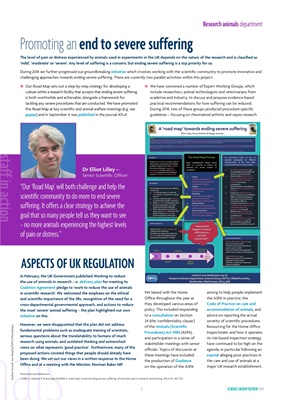
17 SCIENCE GROUP REVIEW 2014
Research animals department
Promoting an end to severe suffering
The level of pain or distress experienced by animals used in experiments in the UK depends on the nature of the research and is classified as
'mild', 'moderate' or 'severe'. Any level of suffering is a concern, but ending severe suffering is a top priority for us.
During 2014 we further progressed our groundbreaking initiative which involves working with the scientific community to promote innovative and
challenging approaches towards ending severe suffering. There are currently two parallel activities within this project.
Dr Elliot Lilley -
Senior Scientific Officer
"Our 'Road Map' will both challenge and help the
scientific community to do more to end severe
suffering. It offers a clear strategy to achieve the
goal that so many people tell us they want to see
- no more animals experiencing the highest levels
of pain or distress."
staff in action
l Our Road Map sets out a step-by-step strategy for developing a
culture within a research facility that accepts that ending severe suffering
is both worthwhile and achievable, alongside a framework for
tackling any severe procedures that are conducted. We have promoted
this Road Map at key scientific and animal welfare meetings (e.g. see
poster) and in September it was published in the journal ATLA1.
l We have convened a number of Expert Working Groups, which
include researchers, animal technologists and veterinarians from
academia and industry, to discuss and propose evidence-based
practical recommendations for how suffering can be reduced.
During 2014, two of these groups produced procedure-specific
guidelines - focusing on rheumatoid arthritis and sepsis research.
We liaised with the Home
Office throughout the year as
they developed various areas of
policy. This included responding
to a consultation on Section
24 (the 'confidentiality clause')
of the Animals (Scientific
Procedures) Act 1986 (ASPA),
and participation in a series of
stakeholder meetings with senior
officials. Topics of discussion at
these meetings have included:
the production of Guidance
on the operation of the ASPA
aiming to help people implement
the ASPA in practice, the
Code of Practice on care and
accommodation of animals, and
advice on reporting the actual
severity of scientific procedures.
Resourcing for the Home Office
Inspectorate, and how it operates
its risk-based inspection strategy,
have continued to be high on the
agenda, in particular following an
exposé alleging poor practices in
the care and use of animals at a
major UK research establishment.
Footnotes and references:
1. Lilley E, Hawkins P & Jennings M (2014) A 'road map' toward ending severe suffering of animals used in research and testing. ATLA 42, 267-272.
ASPECTS OF UK REGULATION
In February, the UK Government published Working to reduce
the use of animals in research - a delivery plan for meeting its
Coalition Agreement pledge to 'work to reduce the use of animals
in scientific research'. We welcomed the emphasis on the ethical
and scientific importance of the 3Rs, recognition of the need for a
cross-departmental governmental approach, and actions to reduce
the most 'severe' animal suffering - the plan highlighted our own
initiative on this.
However, we were disappointed that the plan did not address
fundamental problems such as inadequate training of scientists,
serious questions about the translatability to humans of much
research using animals, and outdated thinking and entrenched
views on what represents 'good practice'. Furthermore, many of the
proposed actions covered things that people should already have
been doing. We set out our views in a written response to the Home
Office and at a meeting with the Minister, Norman Baker MP.
Andrew Forsyth, Joe Murphy/RSPCA Photolibrary